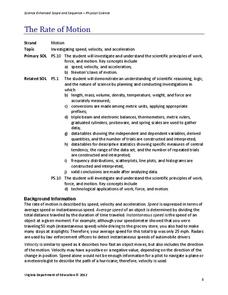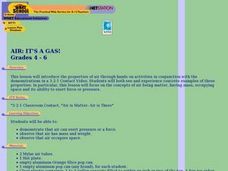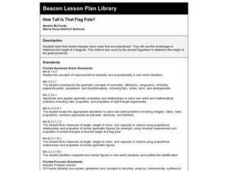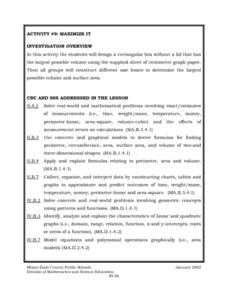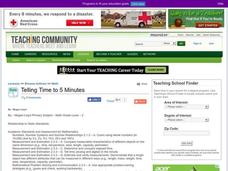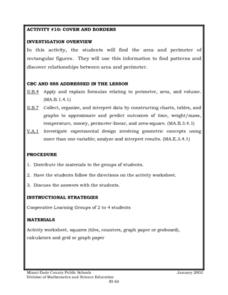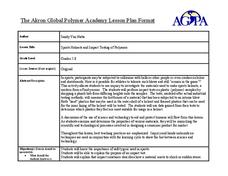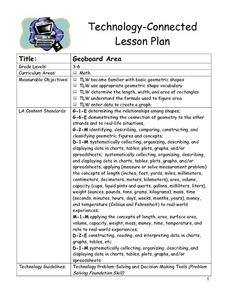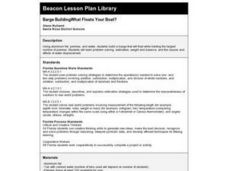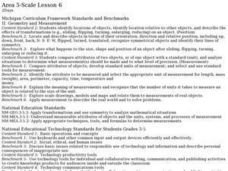Curated OER
Chemistry Review
In this chemistry review worksheet, students identify chemical changes, isotopes, ions, and chemical bonds. This worksheet has 32 multiple choice questions.
Virginia Department of Education
The Rate of Motion
How much time does it take to jump over three balloons? Pupils calculate the speed of tasks that require different motions. They determine motions for tasks such as walking, skipping, hopping, and jumping before creating a...
Curated OER
Speed
Fifth and sixth graders practice working in pairs to determine whether they can walk with constant speed. They test themselves, collect their data, draw graphs with their data collected, manipulate the data, and then draw conclusions...
Virginia Department of Education
Work and Power
Assist your class with correctly calculating the values for force, work, and power as they determine the amount various activities require. They gather data and participate in a group discussion to compare results upon conclusion of the...
Willow Tree
Scientific Notation
Numbers that are very large or very small are difficult to express in standard notation. Pupils learn how to convert between standard and scientific notation. They also multiply and divide the numbers in scientific notation.
Curated OER
Elementary Exploration: Liquids
Students study the attributes of liquids. In this science exploration activity, students participate in a hands-on activity that requires them to examine the volume and shape of liquid.
Curated OER
Air: It's a Gas!
Learners investigate the properties of air through hands-on activities in conjunction with the demonstrations in a 3-2-1 Contact Video.
Curated OER
How Tall Is That Flag Pole?
Pupils examine various triangles and discuss how similar triangles have sides that are proportional. They utilize an ancient Egyptian method to determine the height of a flagpole.
Curated OER
Strength in Size? Madagascar Cockroach Pulls
Fourth graders conduct an experiment involving size and relative ability in smaller species using Madagascar cockroaches. They make predictions about how many pennies the roaches can pull, compare the results to human strength, and...
Curated OER
Permafrost
Students use a thermometer to analyze soil temperature data to determine which soil sample is normal, and which one is permafrost. For this permafrost lesson plan, students participate in a hands on activity where they identify the...
Curated OER
Obesity
Class members participate in a discussion, read a newspaper article, and participate in activities meant to open their eyes to the problem of obesity in the US. There are resource links, electronic worksheets, and teacher's notes to help...
Curated OER
Tick Around the Clock
Students examine and discuss the differences between clocks they are shown. Using the internet, they research how people used to tell time before clocks. They review what the long and short hand on the clock represent and practice...
Curated OER
Maximize It!
Pupils design a rectangular box without a lid that has the largest possible volume using the supplied sheet of centimeter graph paper. They work in groups to construct different size boxes to determine the largest possible volume and...
Curated OER
Telling Time to 5 Minutes
In this second grade lesson your class will practice telling time. The goal is to tell time to five minutes using an analog clock. Your young students count by 5 minute intervals and discuss elapsed time.
Curated OER
Maps and Modes, Finding a Mean Home on the Range
Fifth graders investigate data from maps to solve problems. In this data lesson, 5th graders study maps and collect data from each map. Students present their data in a variety of ways and calculate the mode, mean, median, and range.
Curated OER
Newton's Laws of Motion
Ninth graders utilize Newton's Laws of Motion to explain how things move, create poster illustrating each law of motion, and present and explain their poster to classmates.
Curated OER
Money in Action
Students become familiar with the various coins in our money system as well as amount of each coin. They help develop their ability to count change and find different ways to show equal amounts.
Curated OER
Box and Whiskers
Middle schoolers discover how to relate collected data with a box and whiskers graph in a number of formats. They collect, organize, create, and interpret a box and whiskers graph. Pupils interpret the difference between sets of data,...
Curated OER
Cover and Boarders
Students find the area and perimeter of rectangular figures. They use this information to find patterns and discover relationships between area and perimeter. Students apply and explain formulas relating to perimeter, area, and volume.
Curated OER
Exploring Area and Perimeter
Two students are blindfolded and each receives a cardboard square, one with pompoms glued around the edge and one with pompoms glued all over the surface. They identify what they feel. The class discusses perimeter and area of polygons....
Curated OER
Sports Helmets and Impact Testing of Polymers
Students examine the importance of good quality safety gear. In this investigative lesson, students will tests various polymers, collect data, and analyze the data to determine which polymer is best for safety helmets. They will design a...
Curated OER
Geoboard Area
Students explore the basic geometric shapes and geometric shape vocabulary through the use of geoboards and virtual geoboards. They create a variety of shapes with a partner, build ten different rectangles on their geoboards, and...
Curated OER
Barge Building: What Floats Your Boat?
Students construct aluminum foil boats that float while holding the greatest number of pennies. They investigate the concept of water displacement, record their results, and watch a Bill Nye video on buoyancy.
Curated OER
Scaled Rubber Band Drawings
Students demonstrate the process of creating a scaled rubber band enlargement of a simple drawing. They observe and discuss a teacher-led demonstration, and create a scaled rubber band enlargement of simple drawings and their invention...

